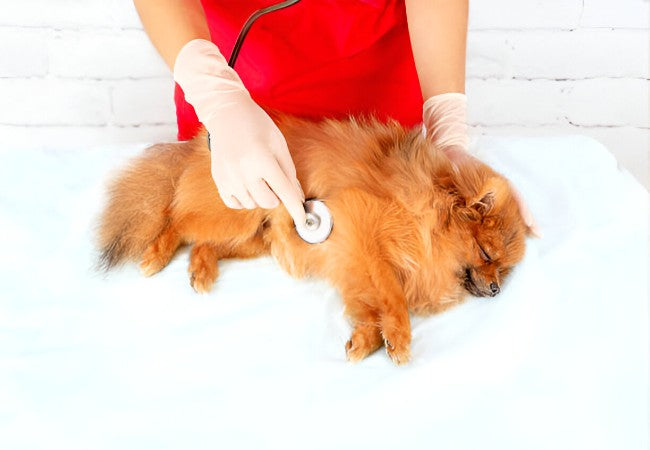Vet Guide to Right-Sided Congestive Heart Failure in Dogs 2025 🐶💧

In this article
Vet Guide to Right-Sided Congestive Heart Failure in Dogs 2025 🐶💧
By Dr. Duncan Houston BVSc
Right-sided congestive heart failure (RS-CHF) occurs when the right heart cannot efficiently pump blood into the lungs. This causes blood to back up into the body's veins, leading to fluid accumulation in the abdomen, limbs, liver, or chest—but not the lungs. This 2025 guide explains the causes, signs, diagnostics, and treatment options to support your dog’s comfort and health. 💊
📍 How RS‑CHF Happens
- Right ventricle or tricuspid valve dysfunction prevents forward blood flow → blood backs up into the right atrium and venous circulation.
- The resulting increased venous pressure forces fluid out of vessels, leading to ascites (abdominal fluid), peripheral edema (limb swelling), hepatomegaly, or pleural effusion.
⚠️ Common Causes
- Tricuspid valve disease (endocardiosis or dysplasia), right ventricular cardiomyopathy, cardiac tumors, or pulmonary hypertension.
- Dilated cardiomyopathy and congenital heart defects may involve right heart failure.
👀 Signs to Watch For
- 👶🏽 Ascites—potbelly swelling and fluid wave sensation in the abdomen.
- 🦵 Peripheral edema—swollen limbs or cutaneous pitting.
- 🟣 Hepatomegaly—enlarged, firm liver seen on palpation or imaging.
- 🌬 Sometimes pleural effusion—difficulty breathing, dull chest sounds.
- 🏥 Nonspecific signs: exercise intolerance, weight loss, fainting, lethargy, pale/blue gums, abdominal discomfort.
🔬 How We Diagnose It
- Physical Exam: abdominal fluid wave, jugular vein distension, muffled lung/heart sounds.
- Blood tests: to assess organ function and rule out other conditions.
- Thoracic and abdominal ultrasound/X-rays: confirm fluid accumulation in the abdomen or chest and evaluate heart size/function.
- Echocardiography: the gold standard to assess right heart structures and pump function.
💊 Medical Management & Support
- Diuretics (furosemide): reduce fluid buildup in tissues and cavities.
- ACE inhibitors or pimobendan: improve cardiac output and lower pressure.
- Address the underlying cause (e.g., valve repair, treat pulmonary hypertension).
- Low-sodium diet to minimize fluid retention.
- Monitor body weight, abdominal girth, resting respiratory rate, and refill fluid regularly.
🏥 Prognosis & Prognostic Tips
- Dogs with mild RS-CHF often stabilize with treatment but may relapse.
- Severe cases with ascites or pleural fluid require ongoing medications and monitoring.
- Regular checkups, diagnostics, and treatment adjustments are key to maintaining quality of life.
📊 Quick Reference Table
| Feature | RS‑CHF vs LS‑CHF | Management Focus |
|---|---|---|
| Primary Signs | Ascites, edema, hepatomegaly | Fluid removal, heart support |
| Diagnostics | Abdominal/Thoracic imaging | Echo & monitor pressure |
| Key Meds | Furosemide, ACE-I,a pimobendan | Diuresis & afterload reduction |
| Prognosis | Chronic management; relapses common | Adjust therapy often |
✅ Vet Tips by Dr Duncan Houston BVSc
- ✔ Check for ascites early during physical exam.
- ✔ Combine diuretics with pimobendan for optimal volume and heart support.
- ✔ Evaluate heart rhythm for arrhythmias and manage accordingly.
- ✔ Teach owners to monitor weight, abdominal girth and respiratory rate at home.
- ✔ Frequent rechecks: fluid status, electrolytes, kidney/liver function, echo follow-up.
If your dog has a bloated belly, limb swelling, breathing changes, or tiredness, use the AskAVet.com app for urgent advice. Record meds, symptoms. Early detection and consistent care support longer, happier lives. 🐾❤️






